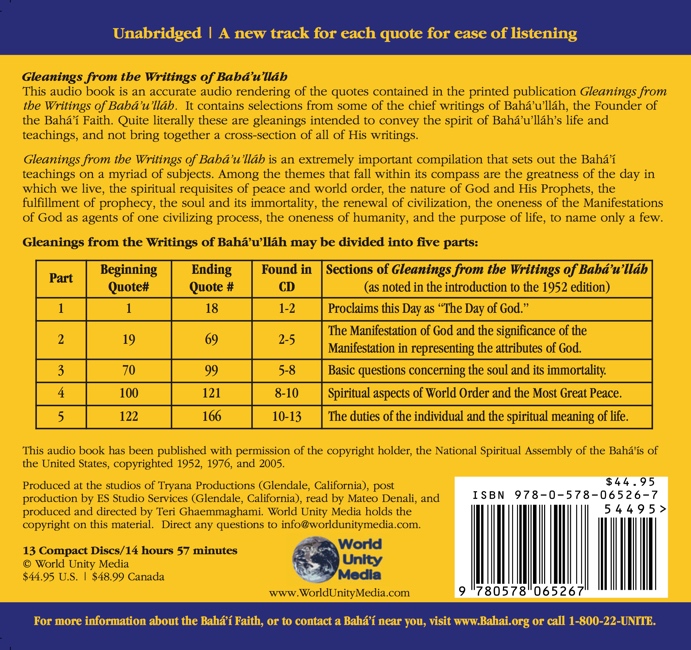Bahá’í Teachings: Gleanings from the Writings of Bahá’u’lláh – A Gift to Humanity
The Bahá’í Faith, an emerging global religion, espouses a philosophy that seeks the unity of humanity and the betterment of the world. At the heart of this belief system lies the profound corpus of texts penned by its founder, Bahá’u’lláh. Among these sacred writings, the “Gleanings from the Writings of Bahá’u’lláh” serves as a quintessential anthology that distills the essence of His teachings. This compilation is not merely a collection of doctrines; it is a transcendent gift, offering ethical guidance, spiritual illumination, and a clarion call to universal peace.
The Philosophical Foundations of “Gleanings”
“Gleanings” is an invitation to engage with principles that transcend mere scholarly interest; it beckons the reader to undertake a profound spiritual exploration. Within its pages, Bahá’u’lláh elucidates concepts such as the unity of God, the interconnectedness of all religions, and the importance of justice. Each of these themes is interwoven, forming a tapestry that speaks to the eternal nature of truth and the evolving understanding of humanity’s spiritual journey.
One pervasive observation among those who delve into “Gleanings” is the author’s approach to contrasts. Bahá’u’lláh does not shy away from confronting complex dilemmas that plague human existence. By juxtaposing themes of love with justice, individual responsibility with collective welfare, and the manifested diversity of religious expressions with inherent unity, He presents a holistic viewpoint that encourages deeper contemplation and understanding. This dialectical method not only enriches one’s intellectual palate but also incites the heart to seek deeper truths.
The Themes of Unity and Justice
Central to Bahá’í teachings is the principle of unity—unity of God, unity of religion, and unity of humanity. Bahá’u’lláh posits that all major religions stem from the same divine source and that their varying teachings are complementary rather than contradictory. This assertion invites individuals to rise above parochial loyalties and embrace a broader perspective, urging followers to perceive one another through the lens of shared spiritual heritage.
Justice stands as the fulcrum of Bahá’u’lláh’s vision for a harmonious society. He ardently advocates that justice must pervade all aspects of life, from personal conduct to global governance. The call for justice within “Gleanings” is an urgent plea for moral rectitude, reminding humanity of its obligations towards one another. It instills in readers an innate sense of responsibility, fostering an environment where justice is not merely an ideal but a living practice.
Spiritual Development and Human Capacities
This transformative ethos is encapsulated in the writings that call for the development of virtues such as truthfulness, compassion, and altruism. The text iteratively emphasizes that spiritual growth is interlinked with acts of service, creating a virtuous cycle between personal enlightenment and communal welfare. This synergy between individual development and societal progress is a consistent theme, challenging readers to adopt inclusive perspectives that foster global harmony.
Fostering a Global Society
In a world polarized by conflict and division, “Gleanings” emerges as a beacon of hope. Bahá’u’lláh’s vision of a unified global society is predicated on the elimination of prejudices—be they racial, religious, or cultural. It adopts a revolutionary stance in advocating for equality, particularly emphasizing the integral role of women in the advancement of civilization. This emphasis on gender equality is not merely a progressive notion; it is framed as a moral and spiritual imperative, essential for the realization of global peace.
The compilation encourages a systemic re-evaluation of societal structures, prompting contemplation about the role of education, economic justice, and the humanitarian ethos. It innovatively combines spiritual veracity with practical considerations, presenting a comprehensive blueprint for societal evolution. Herein lies the crux of fascination for many: the notion that spiritual teachings are not confined to otherworldly aspirations but have profound implications for tangible improvement of human conditions.
The Relevance of “Gleanings” Today
In this contemporary epoch, as humanity grapples with existential challenges, the relevance of “Gleanings” resonates profoundly. Its teachings provide a framework for dialogue and understanding across disparate cultures and religions. It posits that the antidote to division lies in recognizing and celebrating diversity while simultaneously acknowledging the shared pursuit of truth.
Furthermore, Bahá’u’lláh’s insights into the nature of change—both personal and societal—emphasize the necessity for resilience in the face of adversity. This perspective empowers individuals and communities to approach challenges with a newfound vigor, fostering a proactive stance toward change that aligns with higher principles of justice and unity.
Conclusion
“Gleanings from the Writings of Bahá’u’lláh” is not merely an anthology; it is a vital commentary on the human condition. Its teachings advocate for unity, justice, and the spiritual advancement of humanity—a clarion call that remains pertinent across generations. The fascination it incites stems from its elegant synthesis of profound spiritual insights and practical guidance, offering a beacon of hope for a fragmented world. It invites individuals not only to reflect but also to act, transforming the text into a living testament of Bahá’u’lláh’s vision for humanity. In this light, the work stands not just as a gift but as a catalyst for collective awakening and transformation in the pursuit of a more just and unified world.
